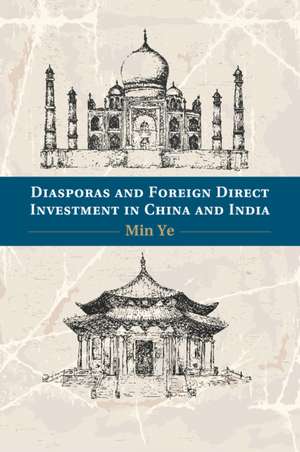Diasporas and Foreign Direct Investment in China and India
Autor Min Yeen Limba Engleză Paperback – apr 2020
Preț: 235.84 lei
Nou
Puncte Express: 354
Preț estimativ în valută:
45.13€ • 46.63$ • 37.56£
45.13€ • 46.63$ • 37.56£
Carte tipărită la comandă
Livrare economică 26 martie-09 aprilie
Preluare comenzi: 021 569.72.76
Specificații
ISBN-13: 9781107666108
ISBN-10: 1107666104
Pagini: 258
Ilustrații: 16 b/w illus. 3 maps 25 tables
Dimensiuni: 153 x 230 x 15 mm
Greutate: 0.39 kg
Editura: Cambridge University Press
Colecția Cambridge University Press
Locul publicării:New York, United States
ISBN-10: 1107666104
Pagini: 258
Ilustrații: 16 b/w illus. 3 maps 25 tables
Dimensiuni: 153 x 230 x 15 mm
Greutate: 0.39 kg
Editura: Cambridge University Press
Colecția Cambridge University Press
Locul publicării:New York, United States
Cuprins
Part I. Introduction and Theory: 1. Introduction: foreign direct investment in China and India; 2. Social network theory: diaspora, domestic industry, and diffusion of FDI liberalization; Part II. Reform Stage I: 3. Diasporic entrepreneurs and diffusion of FDI liberalization in China; 4. Deregulation without openness in India; Part III. Reform Stage II: 5. Deepening diffusion: zone fever and SOE reform in China; 6. Transforming Indian business: the foundation and limitation of India's FDI liberalization; Part IV. Sectors: 7. China's electronics and automobiles; 8. FDI liberalization in India's informatics and autos; 9. Conclusion: state, diasporas, and development.
Recenzii
'Economic studies of foreign direct investment have largely ignored the social context in which such investment takes place. In this powerful corrective, Min Ye traces the effects of diasporas not only on capital flows but on the wider policy context. She reinterprets the economic opening of the two developing giants - China and India - and their wider growth experience more generally.' Stephan Haggard, Krause Professor, Graduate School of International Relations and Pacific Studies, University of California, San Diego
'Foreign direct investment is often considered an exclusive purview of Western multinationals. Min Ye's book provides a fascinating comparison of the crucial role played by a different network - overseas co-ethnics - in promoting foreign direct investment in China and India. Her conclusion is that while diaspora-sourced FDI has been important in both countries, it has until recently been much less contested in China, shedding a new explanatory light on differences in these countries' respective paths to economic transformation. Ye's book is a novel and compelling contribution to the emergent comparative literature on the political economy of China.' Margaret M. Pearson, University of Maryland, College Park
'Foreign direct investment has been a main driving force behind the rapid development of Asia's two giant economies, China and India. The Western nations, the usual FDI sources in the developing world, were not the FDI providers, however. What has fuelled the globalization of the two economies? In this comparative and historical analysis, Min Ye reveals that it was the FDI patterns of the Chinese and Indian diasporas that have given rise to the differing performance of the two economies. All those who would like to uncover the secrets of these two Asian economies and their linkages with the rest of the world should read it; it is also a valuable guide for the future of the two increasingly important Asian giants.' Zheng Yongnian, National University of Singapore
'Foreign direct investment is often considered an exclusive purview of Western multinationals. Min Ye's book provides a fascinating comparison of the crucial role played by a different network - overseas co-ethnics - in promoting foreign direct investment in China and India. Her conclusion is that while diaspora-sourced FDI has been important in both countries, it has until recently been much less contested in China, shedding a new explanatory light on differences in these countries' respective paths to economic transformation. Ye's book is a novel and compelling contribution to the emergent comparative literature on the political economy of China.' Margaret M. Pearson, University of Maryland, College Park
'Foreign direct investment has been a main driving force behind the rapid development of Asia's two giant economies, China and India. The Western nations, the usual FDI sources in the developing world, were not the FDI providers, however. What has fuelled the globalization of the two economies? In this comparative and historical analysis, Min Ye reveals that it was the FDI patterns of the Chinese and Indian diasporas that have given rise to the differing performance of the two economies. All those who would like to uncover the secrets of these two Asian economies and their linkages with the rest of the world should read it; it is also a valuable guide for the future of the two increasingly important Asian giants.' Zheng Yongnian, National University of Singapore
Notă biografică
Descriere
A comparative and historical analysis of foreign direct investment liberalization in China and India, explaining how the return of these countries' diasporas affects such liberalization.
